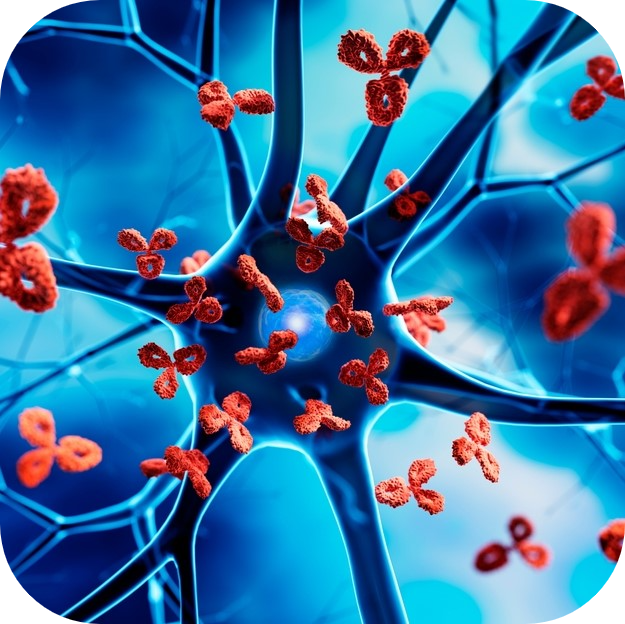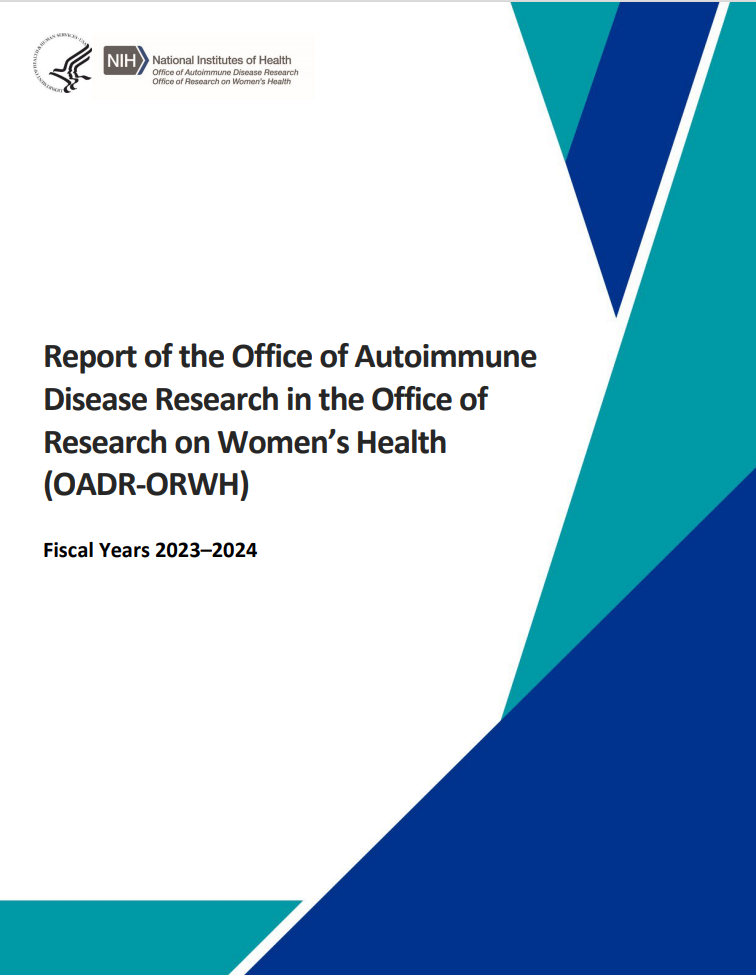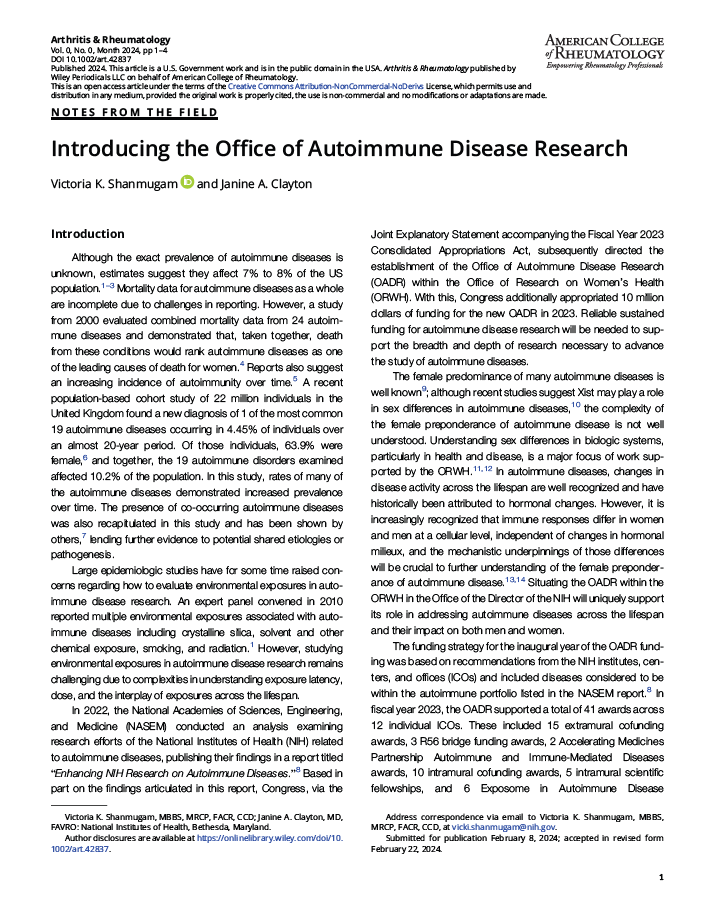-
Learn more and register
Join OADR-ORWH for the “Nutrition for OUR Immune System Health Autoimmunity Challenge Winner’s Webinar” on Monday, March 30, 2026, 4:00 PM ET, for an online session.
-
Read more about the research
Insights into Underlying Causes of Sjögren's Disease Points to Existing Drug as Promising Treatment Candidate
A recent NIH-supported study in mouse models offers important insights into Sjögren's disease, a chronic autoimmune condition affecting up to four million Americans.
-
Read about the awarded scholars and their proposals
Leadership Scholars Program in Women's Health, Autoimmune Diseases, and Immune-Mediated Diseases Names Three New Awardees
The Accelerating Medicines Partnership® Autoimmune and Immune-Mediated Diseases Leadership Scholars Program (AMP® AIM LSP) has announced pilot project support for the three new award recipients.
-
Learn more about the awardees and their research
Introducing the 2024 Office of Autoimmune Disease Research R56 Awardees
The 2024 Office of Autoimmune Disease Research R56 awards will support short-term, highly meritorious extramural research focused on autoimmune disease topics highly impactful to quality of life and survival.
-
Learn more about the future of NIH-funded autoimmune disease research
JUST LAUNCHED: NIH-Wide Strategic Plan for Autoimmune Disease Research
The inaugural NIH-wide Strategic Plan for Autoimmune Disease Research sets a bold vision for establishing priorities, coordinating efforts, fostering collaboration, and improving the lives of those living with and at risk for autoimmune diseases.
About the Office of Autoimmune Disease Research (OADR-ORWH)

Approximately 8% of the U.S. population is living with an autoimmune disease, and nearly 80% of those with an autoimmune disease are women.[1] The category of autoimmune diseases includes more than 140 diseases that are chronic and in many cases debilitating—with no known cures.[2] These diseases can affect almost every organ in the body and can occur at any point across the lifespan.[1] Despite their high prevalence and morbidity, many autoimmune diseases are understudied, and treatment options are limited.
To accelerate progress in this area, in 2022, the U.S. Congress directed NIH to establish an Office of Autoimmune Disease Research within ORWH.
As described in the Consolidated Appropriations Act, 2023 (Public Law 117-328) for the departments of Labor, Health and Human Services, and Education, and related agencies, the Office of Autoimmune Disease Research (OADR-ORWH) will:
- Coordinate development of a multi–institute and center (IC) strategic research plan;
- Identify emerging areas of innovation and research opportunity;
- Coordinate and foster collaborative research across ICs;
- Annually evaluate the NIH autoimmune disease research (ADR) portfolio;
- Provide resources to support planning, collaboration, and innovation; and
- Develop a publicly accessible central repository for ADR.
These directives—along with the findings of the National Academies of Sciences, Engineering, and Medicine (NASEM) report titled Enhancing NIH Research on Autoimmune Disease—guide the establishment of the office.
OADR-ORWH Mission
The mission of OADR-ORWH is to support high priority autoimmune disease research, identify emerging areas of innovation, and foster collaboration across NIH ICOs.
To learn more about how OADR-ORWH has been achieving this mission and fulfilling the congressional directives since its inception, check out the inaugural Report of the Office of Autoimmune Disease Research in the Office of Research on Women’s Health (OADR-ORWH). Published in January 2025, the report examines the activities and achievements of OADR-ORWH in Fiscal Years 2023 and 2024.
Autoimmune diseases occur when the body’s immune system malfunctions and mistakenly attacks the body’s healthy cells, tissues, and organs.
Autoimmune diseases include at least 80 acute and chronic illnesses that are often disabling, such as Sjögren’s disease, systemic lupus erythematosus (SLE), antiphospholipid syndrome, rheumatoid arthritis, psoriasis, inflammatory bowel disease (IBD), celiac disease, primary biliary cholangitis, multiple sclerosis, type 1 diabetes, and autoimmune thyroid disease. For more information, refer to the 2022 NASEM report Enhancing NIH Research on Autoimmune Disease.
The reasons underlying the higher prevalence of autoimmune diseases in women are not yet understood.[1] In addition, not all autoimmune diseases act the same; some autoimmune diseases are many times more prevalent in women, and some affect men and women at similar rates. These diseases also affect males and females differently.
Though the complex factors underlying these differences are not yet clear, a growing body of research has documented significant sex differences in the immune system which contribute to the sex differences observed in the symptoms, expression, treatment response, and prevalence of autoimmune diseases. For example, women tend to have a more robust immune response than men, which may contribute to improved outcomes in infectious diseases and greater vulnerability to autoimmune diseases.[3] Psychosocial and cultural factors, as well as environmental exposures, may also contribute to the risk of developing autoimmune diseases. More research is needed to understand how these factors contribute to autoimmune disease development.
The direction to establish OADR-ORWH stemmed from recommendations from the NASEM report Enhancing NIH Research on Autoimmune Disease, which identified a need for greater coordination across NIH regarding autoimmune disease research. The report recommended that an Office of Autoimmune Disease Research be established within OD, and Congress selected ORWH to establish this office in because autoimmune diseases disproportionately affect women.
As one of the 14 cross-cutting offices in OD’s Division of Program Coordination, Planning, and Strategic Initiatives, ORWH is experienced and skilled at coordinating across NIH to create pathways for collaboration, foster collective innovation, and mobilize multidisciplinary efforts to advance the health of women. As a part of ORWH, OADR-ORWH will be able to leverage this existing expertise, infrastructure, and position to inform and amplify its efforts.
The Office of Autoimmune Disease Research (OADR-ORWH) is currently advancing several initiatives that will lay the foundation for high-priority autoimmune disease research (ADR) at NIH.
OADR-ORWH is evaluating NIH’s ADR portfolio, which includes more than 140 diseases. In partnership with key subject matter experts, the office is curating and analyzing research funded by NIH within the past 5 years to generate a baseline landscape analysis of the portfolio. Understanding the NIH ADR portfolio is critical to identifying opportunities to advance research and assess progress moving forward. This portfolio analysis will inform the inaugural NIH-wide strategic plan for ADR.
The strategic plan, which will guide future OADR-ORWH activities, aims to amplify institute, center and office efforts and advance opportunities for innovation. For more information on strategic planning for ADR, please visit Strategic Planning for ADR at NIH.
To learn more about current OADR-ORWH activities, please visit our Events page to join us at the next virtual Updates on OADR-ORWH session.
For more information on these efforts, please visit Autoimmune Disease Research Across NIH.
NIH supports a broad range of basic to clinical research on autoimmunity and autoimmune diseases. OADR-ORWH is conducting a baseline landscape analysis of NIH’s autoimmune disease research (ADR) portfolio. For the purposes of this analysis, more than 140 diseases and conditions included in the National Academies of Science, Engineering and Medicine report, Enhancing NIH Research on Autoimmune Disease, and considered to be either autoimmune or that co-exist with other autoimmune diseases will be reviewed. For more information on ADR across NIH and updates on the ongoing portfolio analysis, please visit the ADR Across NIH page.
Future OADR-ORWH-supported research will most likely investigate genetics, environmental exposures, biomarkers, sex influences, co-occurring autoimmune diseases, mechanistic pathways as therapeutic targets, animal models, systems biology, and translational research as they relate to various autoimmune diseases.
OADR-ORWH has published "Coordination and Collaboration to Support Exposome Research in Autoimmune Diseases" in Arthritis Care & Research, the official journal of the American College of Rheumatology and the Association of Rheumatology Professionals.
The NIH’s investment in autoimmune disease research has increased over the past 5 years, from $800 million to over $1 billion ($1,020,993,432) in fiscal year (FY) 2022. In FY 2021 and FY 2022, 1,425 new research and administrative supplement grants listed "autoimmune disease” as the spending category. However, it is important to note that progress in our understanding of autoimmune disease research may not necessarily arise from research categorized as such. At NIH, we recognize that disease does not occur in a vacuum; disease-focused research often aligns with multiple ICO mission areas, allowing for a multidisciplinary approach.
For questions about OADR-ORWH, please reach out to OADRInfo@nih.gov. To receive updates directly to your inbox, please provide your email in the “Subscribe to Our Communications” box at the bottom of the page. When prompted, opt in to receive news and announcements from The Office of Autoimmune Disease Research (OADR-ORWH).
To learn more and sign up for the next virtual Updates on OADR-ORWH session, please visit the OADR-ORWH Events page.
For media inquiries, please use orwhinfo@nih.gov.



